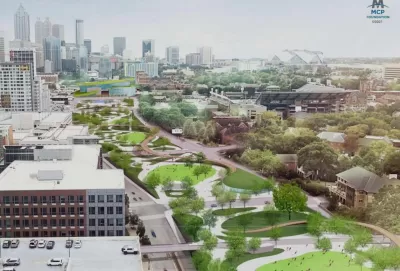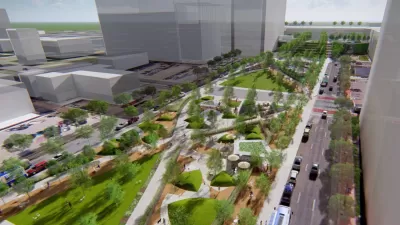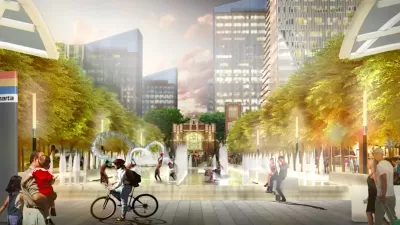The federal funding will help move forward planning for an ambitious proposal to cap a downtown Atlanta freeway with a 25-acre park.

Thanks to funding from the federal omnibus bill signed at the end of 2022, Atlanta can move forward with a design and engineering plan for capping the Midtown Connector, a project years in the works that would help repair the damage caused by the freeway and reconnect surrounding neighborhoods. Josh Green explains the proposal in Urbanize Atlanta.
Green outlines the project’s history, which began. in early 2021 when the MCP Foundation first revealed their vision for “a picturesque, grandiose greenspace larger than Centennial Olympic Park built over the downtown Connector.” The proposed 25-acre park would improve pedestrian access and provide community amenities including a children’s garden, dog park, and café. According to the article, “Project backers said in September private donors had contributed nearly $100 million to the initiative. Georgia Tech, Midtown Alliance, and the Georgia Department of Transportation have all provided technical support and guidance for the project so far, according to the MCP Foundation.”
The $3.2 million allocated to the project is just over half of the $6 million requested by U.S. Congresswoman Nikema Williams and U.S. Senator Reverend Raphael Warnock, and a drop in the bucket for the estimated full cost of as much as $1.2 billion. Warnock said in a statement, “This funding will help create new mobility options and economic opportunities in the heart of our state’s capital, and I’m going to continue fighting to see this critical infrastructure project come fully to life.”
FULL STORY: Effort to cap Connector in Midtown bags millions in federal cash

Planetizen Federal Action Tracker
A weekly monitor of how Trump’s orders and actions are impacting planners and planning in America.

Map: Where Senate Republicans Want to Sell Your Public Lands
For public land advocates, the Senate Republicans’ proposal to sell millions of acres of public land in the West is “the biggest fight of their careers.”

Restaurant Patios Were a Pandemic Win — Why Were They so Hard to Keep?
Social distancing requirements and changes in travel patterns prompted cities to pilot new uses for street and sidewalk space. Then it got complicated.

Platform Pilsner: Vancouver Transit Agency Releases... a Beer?
TransLink will receive a portion of every sale of the four-pack.

Toronto Weighs Cheaper Transit, Parking Hikes for Major Events
Special event rates would take effect during large festivals, sports games and concerts to ‘discourage driving, manage congestion and free up space for transit.”

Berlin to Consider Car-Free Zone Larger Than Manhattan
The area bound by the 22-mile Ringbahn would still allow 12 uses of a private automobile per year per person, and several other exemptions.
Urban Design for Planners 1: Software Tools
This six-course series explores essential urban design concepts using open source software and equips planners with the tools they need to participate fully in the urban design process.
Planning for Universal Design
Learn the tools for implementing Universal Design in planning regulations.
Heyer Gruel & Associates PA
JM Goldson LLC
Custer County Colorado
City of Camden Redevelopment Agency
City of Astoria
Transportation Research & Education Center (TREC) at Portland State University
Camden Redevelopment Agency
City of Claremont
Municipality of Princeton (NJ)





























